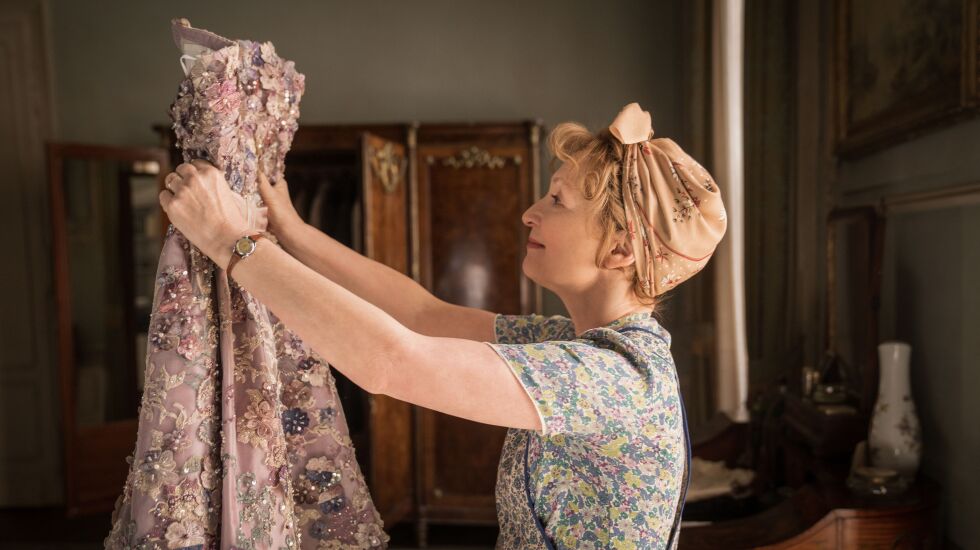
I’m going to come right out and say it: “Mrs. Harris Goes to Paris” is the “Rocky” of underdog haute couture movies.
Fine, so it’s not exactly a crowded genre, but I stand by that statement.
Also: With “Phantom Thread” (2017) and now “Mrs. Harris,” the sublime and wonderful Lesley Manville is absolutely dominating the genre of 1950s Period Piece Dramas About the Art of Dressmaking.
Fine, so I don’t think there’s even a second-place finisher in this category, but again: I stand by my statement.
Manville’s tightly wound, controlling and insufferably snooty Cyril Woodcock in “Phantom Thread” would be absolutely appalled by Manville’s sweet and sincere and doggedly determined Ada Harris in “Mrs. Harris Goes to Paris,” and it’s a tribute to Manville’s incredible, chameleonic range that we’re chilled by her character throughout most of the former movie and we’re charmed to death by her character in this honey-laced cup of tea. We’re on high Whimsy Alert from start to finish with “Mrs. Harris…,” which is in the cheeky Brit-com tradition of “The Phantom of the Open” from last month, not to mention “Calendar Girls” and “Saving Grace” and “The Full Monty” and “The Englishman Who Went Up a Hill But Came Down a Mountain” and “Military Wives” and you know these films, they’re as comfortable as an evening spent in your favorite sweats on your favorite chair under your favorite blanket.
Based on a 1958 novel by Paul Gallico and brought to the big screen with cheeky style and lovely attention to the 1950s time period by director and co-writer Anthony Fabian, “Mrs. Harris” features a perfectly cast ensemble and the kind of magical realism where you find yourself choking up on numerous occasions — not because something tragic has happened, but because someone has bestowed an act of kindness on someone else, simply out of the goodness of their heart. (The novel was previously adapted for a 1992 TV movie starring Angela Lansbury.) Even the putative semi-villains in this story are shown to be decent sorts if you get to know their backstories. (There are two relatively minor characters who remain rather awful from start to finish, but in each instance, it’s for comedic-foil effect.)
In the post-war London of the 1950s, Manville’s Ada Harris is only now coming to accept her beloved husband Eddie, who went missing in action, is never coming home. Over the last many years, Ada has worked as a cleaning woman and has spent her evenings quietly at home, or occasionally at the local pubs with her best friend Vi (Ellen Thomas), an African Caribbean cleaning woman, and the charmingly raffish Irish bookmaker Archie (Jason Isaacs), who is often seen in the company of younger women but just might have a soft spot for Ada.
When Ada comes across a fairy-tale gorgeous Dior dress in the closet of one of her clients, she makes a vow: She’s going to make the trip to Paris and purchase a Dior gown of her own, even though it’s going to cost a whopping 500 quid. Through a series of perfect happenstances and some very hard work, Ada is able to raise the funds to cover the trip and the cost of the dress — but once she arrives at the fabled House of Dior just in time for the 10th anniversary collection show for a select group of VIPs, she runs into a series of roadblocks.
Screen legend Isabelle Huppert is magnificent as the formidable Madame Colbert, the director of the House of Dior, who refuses to even admit Ada into the fashion show, Ada’s cash offer notwithstanding. Ah, but here comes the dashing and charming Marquis de Chassagne (Lambert Wilson), a most eligible bachelor of a certain age who invites Ada into the show as his personal guest. Ada also strikes up fast and warm friendships with Dior’s chief accountant, the handsome but shy André (Lucas Bravo), as well as Dior star model Natasha (Alba Baptista), who reads Jean-Paul Sartre and yearns to be taken seriously. (Ooh, here’s Ada’s chance to play matchmaker!)
After Madame Colbert reluctantly acquiesces and Ada is allowed to buy her dream gown, she’s going to have to stay a couple of weeks for the fittings, which gives us plenty of opportunity to soak in the beauty of Paris (the cinematography has a lush, saturated-colors, gloriously 1950s look) while Ada chases her dream. Granted, it might seem superficial and trivial for a cleaning woman from working-class London to yearn for such a gown — Madame Colbert wonders where Ada will ever wear it — but this isn’t about Ada showing off for others. It’s about the feeling of self-celebration she’ll have, even if she just puts it on in her flat and twirls around a bit. (Spoiler alert: You know we’re going to get more than that. Fairy tales don’t end in a solo space.)
“Mrs. Harris Goes to Paris” is the very definition of a feel-good movie. It knows exactly how to press our buttons and we’re fine with that, because we’re just happy to witness this seemingly invisible woman have her well-deserved moment to shine.







